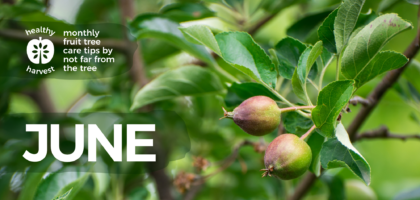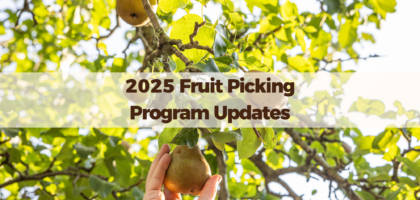
June Healthy Harvest Habits
The city of Toronto is home to a lot of wonderful things: arts, culture, and – if you know where to look -fresh fruit! NFFTT loves picking and sharing the bounty of our urban orchard but we’re not the only ones who like to pick the city’s fruit! Toronto’s core is an area where both squirrels and raccoons famously live and scavenge whatever they can find. Unfortunately for anyone with a fruit tree, fruits are sought after treats for both squirrels and our adorable “trash panda” friends – raccoons. While we adore and respect both of these animals on one hand, they can be a nuisance and disappoint many of our tree registrants year after year by getting to fruit before it can be picked. Squirrels or raccoons eating young, premature fruits is one thing, but they can ravage ripe harvests too! If these fruit bandits aren’t deterred, nesting can also sometimes occur or squirrels chewing on bark can leave open wounds in trees which invites decay and even fungal diseases.
To address the common concern of squirrels and racoons ravaging Toronto’s fruit trees, we’ve compiled a few safe and ethical tips and methods for when things get out of hand with these furry friends. This is not an exhaustive list or a guarantee of any kind but we recommend trying out a combination of these tactics when your tree is getting ripe, for a good chance at preventing or avoiding squirrel and raccoon activity, without hurting the animals.
Tips & Methods
Remove attractive debris
Fallen fruit (and nuts and seeds from bird feeders) attracts both squirrels and racoons. Raking or sweeping beneath your tree to remove these can be a good preventative first step. Use bins with tight lids to dispose of the debris to keep the furry friends out (Toronto’s green bins for compost are ideal!) The cleaner the area, the less attractive it will be to racoons and squirrels. Also avoid leaving other food remnants (including pet’s food bowls and bird feeders) near your tree at night which might attract them to your yard and then your fruit.
Natural sprays
You can spray hot pepper mixtures, oils, or sauces on tree trunks and tree limbs as a deterrent. For example, cayenne powder mixed with water in a spray bottle. Racoons and squirrels are deterred by the scent and taste of capsaicin (the chemical that makes hot peppers “spicy”). Try to avoid getting hot pepper spray on your fruits however, as this may affect their taste! Apple cider vinegar can also be mixed with water for another deterrent spray. Both of these methods should be re-applied after it rains. In earlier stages of the season, natural foliar sprays (on leaves) are also recommended by orchardists to prevent other pests. The fewer the pests, the smaller the chance of disease and the cleaner the area.
Deterrent plants
Try planting some deterrent plants in your yard or garden, near to your fruit tree. Daffodils for example contain a toxin that cannot be eaten by our fruit bandit friends. Squirrels also do not like the taste of hyacinth, snowdrops, or allium, and again neither squirrels nor raccoons enjoy hot peppers. Planting some of these plants can be one more tool in your toolkit for battling fruit bandits.
Tree Pruning
Another prevention for climbing critters after your fruit is pruning. If possible, keep tree limbs away from your home or other structures like sheds or walls where squirrels and raccoons can gain easy access to your tree and its fruits. You can read more about tree pruning on our website, here.
Baffles
Placing baffles or “collars” around trees are popular for preventing squirrels from climbing and can be used for racoons as well. Baffles are commonly used for bird feeder poles but putting a metal collar around fruit trees, at least six feet off the ground, can also make fruit access more difficult for raccoons. You can cut and place sheet metal or read how to make your own kind of baffle for squirrels here.
Lights
Light up the area where raccoons are a problem. The City of Toronto recommends using a 100 watt bulb for every 15 square metres of a garden or yard. Motion sensor lights can also save energy use and act as a surprise to frighten away nighttime prowlers who are after your tree’s fruit.
Sprinklers
Place a motion-activated sprinkler near the bottom of your fruit trees or at an area where raccoons are able to climb and access your tree. The spray of water can startle and deter racoons. Make sure to re-apply any natural spray deterrents you may also be using, after you think the sprinkler has been set off.
Radio
Leaving a radio playing at night near your fruit tree can be a helpful trick as the sound of voices can deter raccoons. To avoid tripping hazards in your yard, try a battery-operated radio.
Did we miss anything?
Do you have any success stories of preventing or deterring Toronto’s fruit bandits?
Further Reading:
Also read these pieces from our friends at Orchard People about keeping birds off fruit trees and fighting fruit tree pests with beneficial bugs
Sources:
– Bonnie L. Grant, Certified Urban Agriculturist
https://www.gardeningknowhow.com/edible/fruits/fegen/squirrel-proof-fruit-trees.htm
https://cwf-fcf.org/en/resources/DIY/habitat-projects/map-your-backyard/repel-rascally-raccoons.html
https://www.hunker.com/13406303/how-to-protect-fruit-trees-from-squirrels-raccoons-and-birds
https://homeguides.sfgate.com/keep-varmints-eating-peaches-off-trees-39016.html
https://www.terminix.com/pest-control/squirrels/removal/squirrels-in-the-yard/
toronto.ca/community-people/animals-pets/wildlife-in-the-city/raccoons/
https://www.havahart.com/articles/raccoons-yard
https://dengarden.com/gardening/Tips-On-How-to-Keep-Raccoons-Out-of-Your-Garden

June Healthy Harvest Habits

2025 Fruit Picking Program Updates